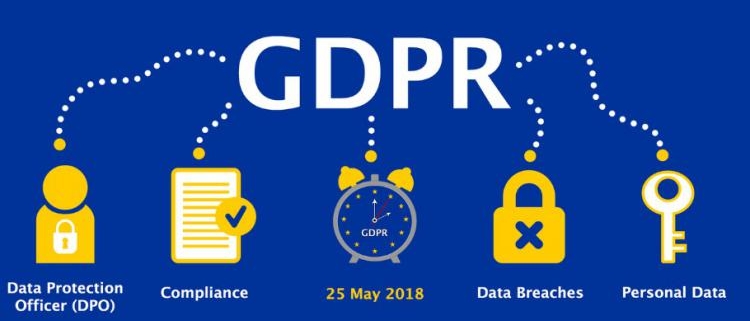Richard Hammond – GDPR is Coming ! (April 2018)
Rich informed everyone that a provisional date of Tuesday 10th July has been set for the Wrexham Landlords Forum, this is to be confirmed by the council. Jacob Jones who is arranging it has asked for landlords to suggest any topics they would like to see covered at the meeting.
Craig Swire attended the RLA’s Forum on Tuesday 24th April. He ran through some of the topics that were discussed at the forum; Douglas Haig who is the Vice Chair of RLA and the director for Wales gave an overview of what work the RLA are doing such as lobbying Government, getting involved in landlord/tenant case law, etc. He requested that all RLA members complete surveys so they can monitor the market and landlord activity accurately. The RLA are actively trying to minimise the long term effect of Section 24 by offering concessions to the Government, for example a reduction in tax for longer tenancies.
In relation to the Right to Rent, so far only 0.003% of tenancies have been prosecuted. It is only an offence if the tenant actually ‘Does not have the Right to Rent.’ It was suggested that landlords write in their tenancy application ‘Tenancy conditional on documents being seen.’
In relation to the new law surrounding EPC’s which came into effect on the 1st April, a landlord can apply for an exemption if the cost of the improvement works is going to cost them personally. Landlords are being encouraged to upgrade their properties sooner rather than later.
If you are a landlord renting properties out in England then you need to ensure you provide your tenant with the most up to date copy of the ‘How to Rent’ guide. The latest version is dated January 2018 but landlords should be aware that this is regularly updated. As a landlord you must update your tenants, otherwise you can’t serve notice without giving them the correct version.
The Property Ombudsman is actively advising landlords to use a reputable letting agent with Client Money Protection. Approximately 30% of letting agents are expected to disappear when the ban on tenant’s fees is introduced. There have been discussions in parliament for an overhaul of the Ombudsman services. The Property Ombudsman predicts that there will be draft legislation on consumer redress direct to landlords in approximately 18 months time; at the moment consumer redress to letting agents only, exists. It is believed this may be linked to the fee ban. Furthermore, as agents increase prices, more landlords will choose to self manage and it is believed this will create a spike in complaints.
In relation to Rent Smart Wales a few examples were given of instance where substantial fines had been imposed on landlords who have failed to comply with their obligations under the scheme.
HMRC making tax digital tax was also discussed. VAT submissions are due to start on 1st April 2019 and will be mandatory for any business earning £85K. Income tax and self assessment will be introduced from 2020. All information will be submitted via third party software providers. HMRC will publish set standards that these developers will have to adhere to. The current tax reporting system will close after 2020. Tax agents and accountants can act on your behalf.
Universal Credit (UC) arrears have spiked to an all time high. 61% of landlords who responded to the RLA’s latest questionnaire have reported rent arrears from a tenant in receipt of UC. 70% of landlords are reporting lower profits. 62% are predicting a reduction of 20% or more with the impending legislation changes. For the first time in many years there are more landlords looking to sell, than are looking to buy. Airbnb is causing an impact in the sector, for example in Greater Manchester there were 1,500 properties listed on Airbnb in 2015 and 6,200 properties listed in 2017. The RLA predicts agent fees will increase in the next 12 months.
The Grenfell disaster was touched upon, in particular there are developments all over the country where there are sub-standard materials within developments. Whilst court cases are ongoing the leaseholders personally have to pay for ‘fire watchmen.’ The RLA are also telling landlords to prepare to pay for building upgrades personally, without the necessary upgrade work these properties are worthless and cannot be rented and cannot be sold i.e. in effect they are unmortgageable.
We welcomed Richard Hammond to this month’s property meet to talk about the new GDPR Regulations which are coming into effect.
Richard began by explaining his current role as a disclosures officer for Cheshire West and Chester Council. He stated that the new GDPR Regulations are coming into effect on the 25th May 2018 notwithstanding the fact that the UK is leaving the EU. They are being brought into effect due to the increasing digital economy, as the current Data Protection Act doesn’t currently provide for this.
GDPR will give us as individuals control of how businesses use and store our personal data. Much of the new legislation is aimed at larger businesses, however it will still impact on all small business owners including private landlords and anyone who collects personal data.
Richard explained what is meant by personal data and went on to give an overview of what landlords need to be aware of under the new Regulations and the potential implications. Some landlords will carry out their own referencing and as a result will hold more personal data about individuals, than landlords who utilise a letting agent to do this.
Landlords need to be aware of and consider the following:-
- What personal data they hold on people and how they document it
- The way in which they should store and communicate personal data
- Their current privacy notices and whether they are sufficient to comply with the new legislation
- How they obtain consent from the individuals whose data they hold. Individuals should be encouraged to opt in via a tick box
- The consequences of breaches under the new GDPR Regulations
Landlords also need to be aware of the potential requirement for them to register with the ICO (Information Commissioner’s Office) It’s worth visiting the ICO website (www.ico.org.uk) as this not only gives guidance on the new Regulations but also takes you through a handy self assessment tool which confirms whether or not you need to register with them.
Richard touched briefly on subject access requests and the changes to these under GDPR. Richard concluded by saying that only time will tell how much of an impact the Regulations are going to have.
Richard was thanked for his very informative talk. He will be back later on in the year to update us on how things have progressed following the implementation of GDPR. In the meantime if anyone has any questions, then we would suggest they look on the ICO website or contact either the RLA or NLA for further advice.




